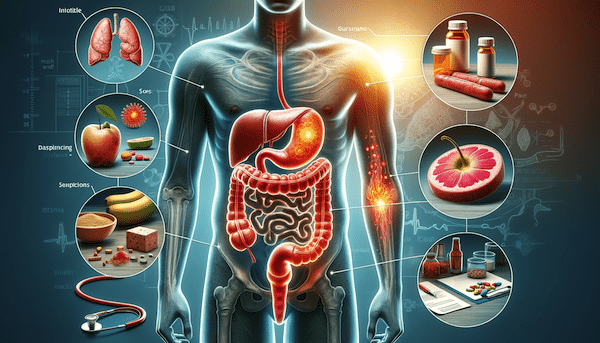Crohn’s Disease: What It Is and What Are the Symptoms
Crohn’s disease is a chronic inflammatory condition of the gastrointestinal (GI) tract. It is one of the major types of inflammatory bowel disease (IBD), which causes inflammation that can affect any part of the GI tract, from the mouth to the anus, but most commonly affects the end of the small intestine (ileum) and the beginning of the colon. The inflammation extends through multiple layers of the bowel tissue, leading to a variety of symptoms and complications.

What Causes Crohn’s Disease?
The exact cause of Crohn’s disease remains unknown, but it is believed to involve a combination of genetic, environmental, and immune system factors. The immune system mistakenly attacks the GI tract, causing inflammation. Risk factors include a family history of the disease, smoking, and certain medications.
Common Symptoms of Crohn’s Disease
The symptoms of Crohn’s disease can vary widely among individuals and can range from mild to severe. They often develop gradually, but sometimes they come on suddenly, without warning. The most common symptoms include:
- Abdominal Pain and Cramping: Typically around the lower right side of the abdomen.
- Diarrhea: Frequent and urgent bowel movements, often accompanied by pain.
- Fatigue: Persistent tiredness and lack of energy.
- Weight Loss: Unintentional loss of weight due to malabsorption and reduced appetite.
- Fever: Low-grade fevers during active inflammation.
- Blood in the Stool: Presence of blood due to bleeding from inflamed intestines.
Other Possible Symptoms
- Mouth Sores: Small ulcers or sores in the mouth.
- Reduced Appetite: Leading to weight loss and malnutrition.
- Perianal Disease: Pain or drainage near or around the anus due to inflammation.
- Joint Pain and Swelling: Inflammation can affect the joints, causing arthritis.
- Skin Disorders: Rashes, ulcers, and other skin problems.
Complications of Crohn’s Disease
If left untreated or poorly managed, Crohn’s disease can lead to several complications, including:
- Strictures: Narrowing of the intestine due to scarring.
- Fistulas: Abnormal connections between different parts of the intestine or between the intestine and other organs.
- Abscesses: Pockets of infection that can form in the abdomen.
- Malnutrition: Due to poor absorption of nutrients.
- Colon Cancer: Increased risk due to chronic inflammation.
Diagnosis and Treatment
Diagnosing Crohn’s disease involves a combination of tests, including blood tests, stool tests, endoscopy, colonoscopy, and imaging studies like CT or MRI scans. There is no cure for Crohn’s disease, but treatments aim to reduce inflammation, control symptoms, and prevent complications. Treatment options include:
- Medications: Anti-inflammatory drugs, immune system suppressors, antibiotics, and biologics.
- Nutritional Therapy: Special diets and supplements to ensure adequate nutrition.
- Surgery: To remove damaged sections of the GI tract or treat complications.
Living with Crohn’s Disease
Managing Crohn’s disease involves regular monitoring and working closely with healthcare providers to manage symptoms and maintain a good quality of life. Lifestyle changes such as stress management, quitting smoking, and following a balanced diet can help manage the condition.
For more information and resources on Crohn’s disease, visit Neurology Mobile.
Understanding Crohn’s disease and recognizing its symptoms early can lead to more effective management and improved outcomes for those affected by this chronic condition.